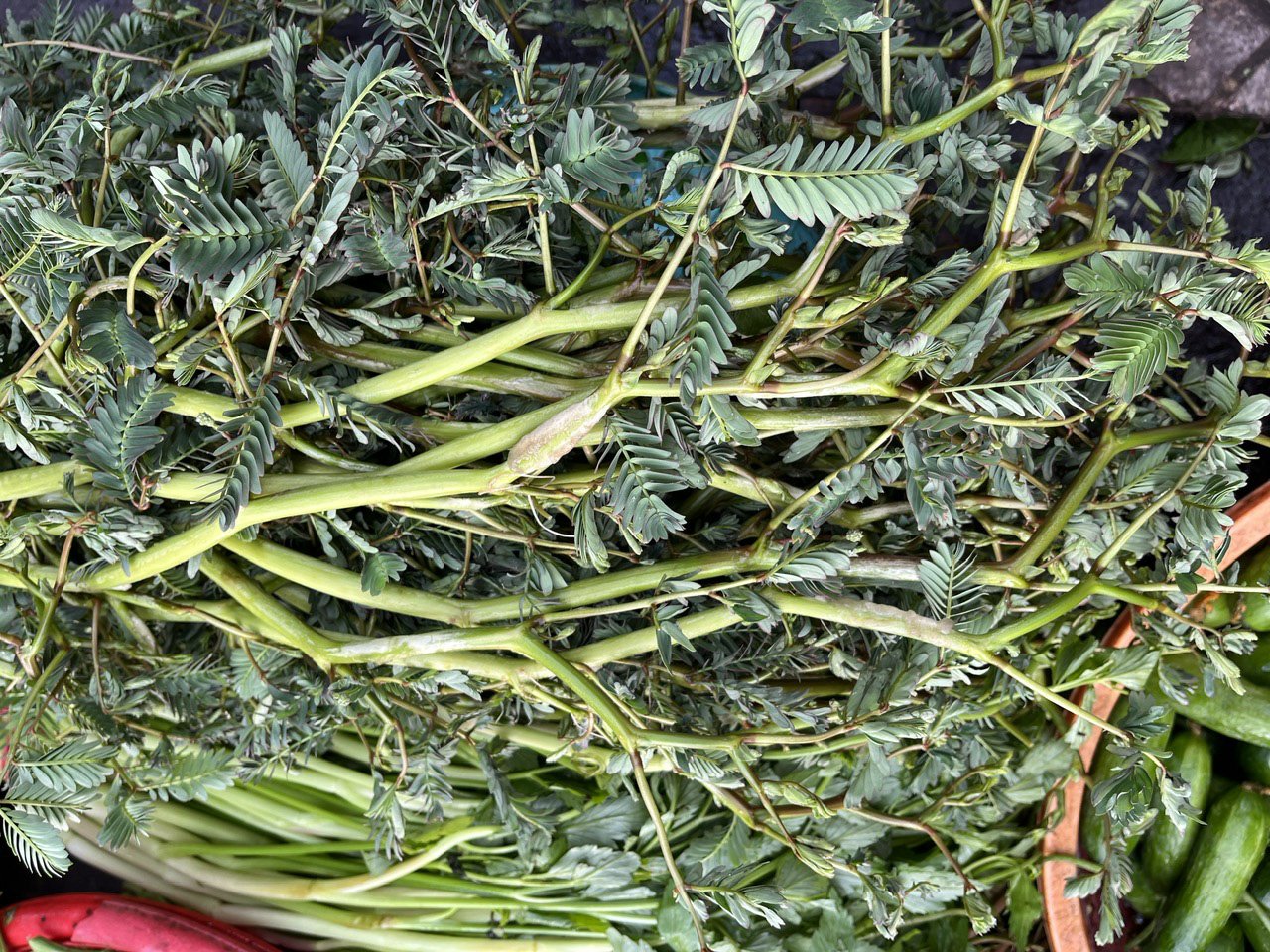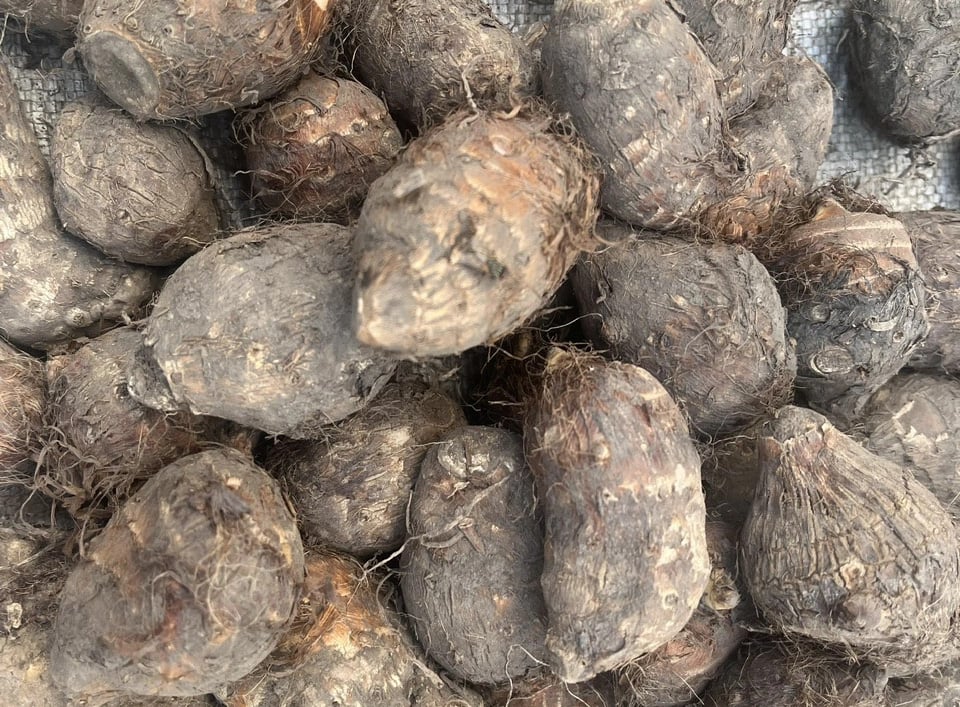
Water spinach is sold at Ba Chieu market, Ho Chi Minh City on hot days - Photo: THUY DUONG
On hot days, just sitting around is tiring. In addition to drinking lots of water and eating lots of fruit, Ms. NTL, 60, said she tries to find cooling, easy-to-eat dishes to cook for herself and her children and grandchildren.
Water spinach soup with crab and taro is the dish she often chooses to cook these days.
Watercress clears heat and toxins, cures insomnia
According to Ms. L., the soft, well-cooked taro soaked in the sweet crab juice is very flavorful, the green, crispy water spinach stands out with the fatty crab meat and rieu, which will be a wonderful, nutritious soup for her family.
Doctor Ngo Thi Bach Yen - head of the treatment - skin care and beauty unit, examination department of Ho Chi Minh City Hospital of Traditional Medicine - said that rau rut is also called rau nhut, is a herbaceous plant that floats on the water surface, with white floats around the stem and pinnate compound leaves.
Water spinach is a very popular vegetable, often cooked in soup with taro and crab paste. Water spinach has a special aroma like that of shiitake mushrooms, the stem is crispy...
The nutritional composition of the vegetable includes amino leucine, theonine, vitamin B12, methionine and very high protein content. Water spinach has a protein content much higher than other vegetables such as lettuce, Malabar spinach, and water spinach.
Water spinach can be cooked in soup with crab, taro or with shrimp, lean pork, chicken... These dishes are delicious, cool, nutritious, and help you sleep well.
According to traditional medicine, water spinach has a sweet taste, cold properties, is non-toxic, has a sedative effect, cools the liver, clears toxins, has the effect of curing insomnia, treating internal heat that causes acne... clears blood vessels, regulates the spleen and stomach, clears the urinary tract, is diuretic, anti-inflammatory, laxative, and antipyretic.
Watercress is also considered a natural remedy for insomnia due to its significant vitamin B12 content. Vitamin B12 in watercress can help the body produce melatonin, a substance needed to relax the mind and improve sleep quality.
The vitamin B12 content in water spinach not only helps treat insomnia but also plays an important role in the formation of red blood cells.
This helps prevent anemia by facilitating the transport of oxygen in the blood, providing nutrition to the body's cells.
Additionally, water spinach is also a good source of protein, which is necessary for the structure and maintenance of cell function. Protein helps create energy and protects overall health.
Water spinach provides a significant amount of fiber, softens stools and aids digestion, helping to relieve constipation. This proves that water spinach is a good food for people with digestive problems.
Finally, water spinach provides many important minerals for bone and joint health, such as phosphorus, calcium, and zinc. This helps strengthen bones, reduce joint pain, and increase bone flexibility.
Although water spinach is a natural and safe food, there are still some rules that need to be followed after deciding to add this vegetable to your diet.
Water spinach is cold in nature, which can cause stomachache or diarrhea, especially in children and people with weak resistance. Eat water spinach in moderation and based on your health condition.
Pregnant women need to be especially careful when eating water spinach, especially raw water spinach. Water spinach often grows in water, where it is likely to be contaminated with dangerous pathogens or worms. Eating water spinach contaminated with these pathogens can be harmful to the fetus.
According to some studies, water spinach has the ability to absorb some heavy metals such as copper, lead, zinc from its living environment. Therefore, consuming too much water spinach can lead to accumulation of heavy metals in the body.
To be safe, stick to the principle of weighing and diversifying your daily diet, not focusing too much on one specific food.
Reduce the risk of chronic diseases
Taro is also a source of potassium, an important mineral for cells and body fluids. By breaking down excess salt, potassium can control and reduce blood pressure. This helps stabilize heart rate and reduce the risk of chronic diseases.

Taro reduces the risk of many chronic diseases - Photo: THUY DUONG
Not only that, the fiber content in this tuber also has the effect of reducing cholesterol - a factor leading to cardiovascular and coronary diseases. Therefore, the blood vessel walls will not be sclerotic or blocked, so the heart will always function healthily.
In addition, "resistant starch" (food that helps intestinal bacteria grow) of taro also brings many benefits such as increasing insulin sensitivity in the body, reducing fat storage, reducing insulinemia response, etc.
Improving the digestive system is a benefit of taro, especially for those who are suffering from constipation, indigestion or bloating. Because this tuber contains up to 27% fiber, it is completely broken down and absorbed.
Taro is also a food that contains a lot of iron and copper, which are minerals necessary for the blood regeneration process. In addition to increasing blood circulation, taro also speeds up the body's metabolism. Therefore, people with anemia should eat dishes made from taro.
Taro also contains vitamin E and vitamin A, two vitamins that have the ability to fight aging. If you supplement this tuber, it will reduce and fade wrinkles and dark spots. In addition, damaged cells will also be rejuvenated.
Doctor Ngo Thi Bach Yen emphasized that 100g of taro can provide the body with about 112 calories, while potatoes only provide 87 calories. Therefore, taro provides abundant energy for the body.
In addition, the amount of complex carbohydrates in taro also has the effect of slowing down digestion, helping you feel full longer, while reducing cravings. In particular, they are low in fat and rich in protein, so they are very suitable for those who want to lose weight.
Taro is a food that contains a lot of carbohydrates, providing energy for the nervous system to function. Therefore, people who have just recovered from illness, thin people, and people with signs of physical weakness should add taro to their meals.
 Harvesting water spinach
Harvesting water spinachSource

































![[Photo] General Secretary To Lam begins official visit to Russia and attends the 80th Anniversary of Victory over Fascism](https://vphoto.vietnam.vn/thumb/1200x675/vietnam/resource/IMAGE/2025/5/8/5d2566d7f67d4a1e9b88bc677831ec9d)



































































Comment (0)